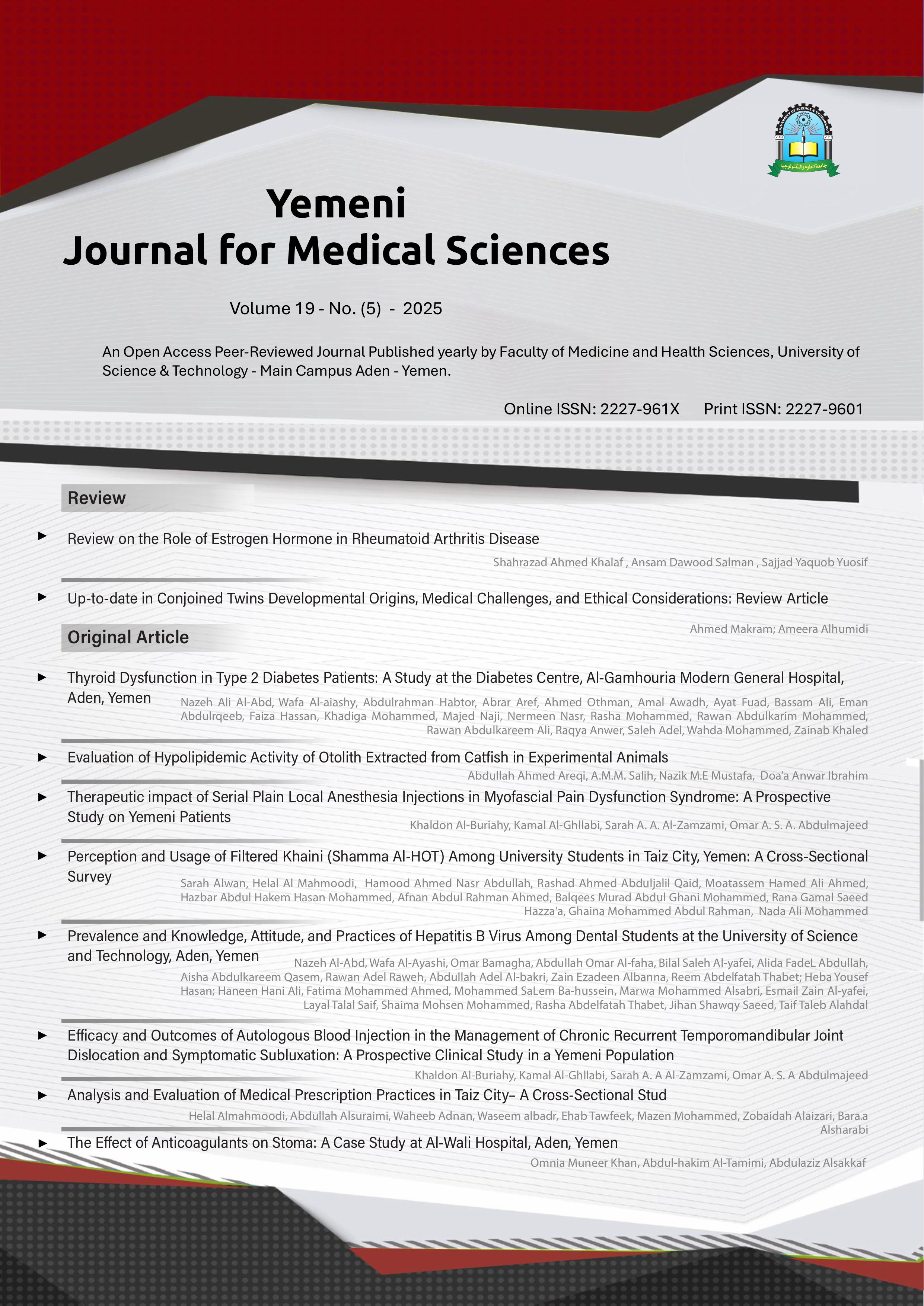Efficacy and Outcomes of Autologous Blood Injection in the Management of Chronic Recurrent Temporomandibular Joint Dislocation and Symptomatic Subluxation: A Prospective Clinical Study in a Yemeni Population
##plugins.themes.bootstrap3.article.main##
Abstract
Background: Persistent, recurring dislocations of the temporomandibular joint (CRTMJD) and related subluxations (CRTMJSS) represent challenging medical conditions marked by repeated displacement of the jaw’s condyle from its socket. Treatment approaches currently span from non-invasive methods to surgical procedures.
Objective: The primary objective of this investigation is to assess the clinical efficacy and safety profile of autologous blood injection (ABI) as a standalone intervention for managing chronic recurrent temporomandibular joint dislocation (CRTMJD) and symptomatic subluxation (CRTMJSS).
Method: A prospective single-arm study after receiving ethics clearance. All participants provided written consent before joining the research initiative. Twenty-six patients (5 males, 21 females; age range: 13–51 years) diagnosed with CRTMJD or CRTMJSS via clinical and radiographic evaluation were enrolled. Under local anesthesia (2% lidocaine), 8 mL of autologous blood was aspirated from the cubital vein. Post-procedure, patients were instructed to limit mouth opening (<2 finger widths) for 7 days. No adjunctive therapies (e.g., arthrocentesis, analgesics) were permitted.
Results: The study exhibited a female predominance (80.8%, n=21), with a mean age of 33.3 ± 12.1 years. Bilateral involvement was observed in 65.4% (n=17) of cases. There were no recurrent dislocations reported during the 6-month follow-up period. MMO decreased by 10–20% (pre-intervention: 48.5 ± 6.2 mm vs. post-intervention: 39.8 ± 5.1 mm; p < 0.01). Mean VAS scores declined from 7.2 ± 1.4 to 2.1 ± 0.8 (p < 0.001). Safety Profile: No adverse events, including ankylosis, infection, or hematoma, were documented.
Conclusion: Autologous blood injection (ABI) demonstrated robust efficacy in preventing recurrent TMJ dislocation (100% success rate) and significantly alleviated pain and functional impairment in this study. The observed reduction in mouth opening (10–20%) aligns with proposed mechanisms of capsular fibrosis, though further biomechanical studies are warranted to elucidate the precise pathophysiology. Importantly, the complete lack of complications following treatment highlights how safe ABI is compared to surgical options.
##plugins.themes.bootstrap3.article.details##
Autologous Blood Injection (ABI), Chronic Recurrent Temporomandibular Joint Dislocation (CRTMJD), Symptomatic Subluxation (CRTMJSS), Maximum Mouth Opening (MMO), Articular Pain

This work is licensed under a Creative Commons Attribution 4.0 International License.
YJMS publishes Open Access articles under the Creative Commons Attribution (CC BY) license. If author(s) submit their manuscript for consideration by YJMS, they agree to have the CC BY license applied to their work, which means that it may be reused in any form provided that the author(s) and the journal are properly cited. Under this license, author(s) also preserve the right of reusing the content of their manuscript provided that they cite the YJMS.








